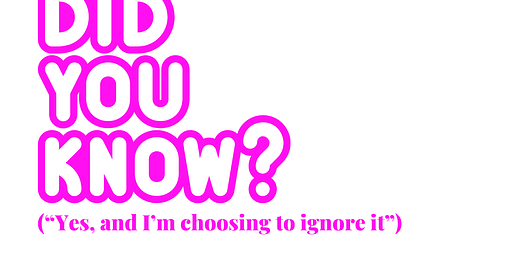I painted the high ceiling in my old house using two broom handles held together with tape and a paintbrush stuck on the end. Using a ladder would have been easier and less messy, but not even an entire encyclopedia of facts about ladders would have stopped me from doing it the way I did it because that’s how I wanted to do it. I wanted a freshly painted ceiling without having to buy (or climb) a ladder to achieve it, so I chose to do it the wrong way to get my preferred outcome.
Bad decisions aren’t always made out of ignorance. People choose to be wrong when it leads to a preferred outcome.
That might not always be obvious. We love to chase after self-serving outcomes but don’t like to admit that the outcomes are self-serving. We also hate to admit to being wrong. So you’re not going to find many who will say, “I know this decision is negatively impacting people and I believe that negatively impacting people is wrong, but I’m choosing to cause that negative impact anyway because doing it will make things better for me.”
Instead, you’ll find people taking actions that directly contradict common sense and are justified by arguments that are easily countered with logic and facts. And you’ll get frustrated when providing the logic and facts doesn’t shift their actions to align with common sense.
It’s never going to if they had all the logic and facts and chose to act against them to achieve the specific outcomes of the actions they’re taking. The outcome is more important than truth.
Recognizing that might save you a lot of time and energy when attempting to debate someone or change a course of action.
Bad decisions that lead to intended outcomes might also be repeated. Frequently. Because, again, the outcome was the point.
I have to clean the exterior windows of my house soon. I think I’ll need to tape three broom handles together to reach the top one.
Have you ever watched someone argue against facts to justify a decision they already made?




